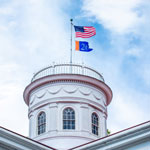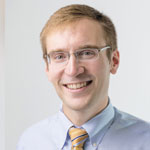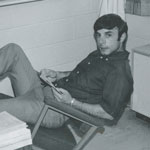
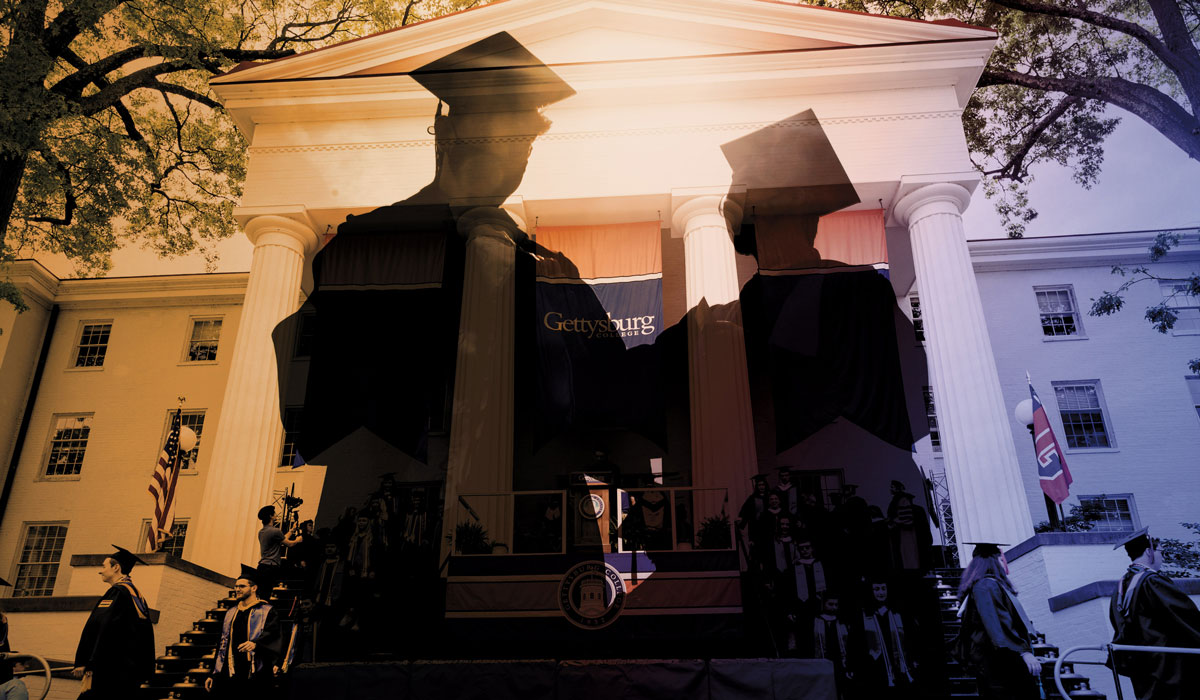
To understand the full meaning of a word or a thoughtfully threaded string of words, English Prof. Christopher Fee P’21, a self-proclaimed word nerd, says you need to delve deeper than the dictionary itself. Just like people and places, tangible objects and abstract ideas, words too have an origin story—an explanation of why things are the way they are. For words, this is found through etymology.
“The primary meaning of the word consequential is ‘having ramifications;’ that is, the effects of actions, in this case, the lasting impact of a Gettysburg education. Ultimately, the word comes from the Latin verb consequi, meaning ‘to follow along,’” Fee said.
In the phrase, A Consequential Education, consequential is a modifier for education—a noun that is widely thought to have two Latin roots, educare and educere, Fee further explained.
“One means ‘to raise’ or ‘to train,’ and the other means ‘to lead out.’ The latter of these is much more in line with my ideal of a Gettysburg education because educere is growth-oriented.”
When connected in the context of Gettysburg College, linguist and Africana Studies Prof. Jennifer Bloomquist says the two words take on a new meaning.
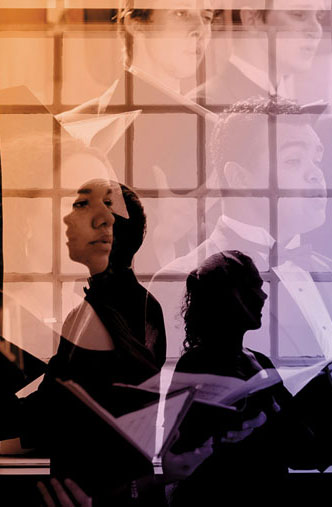
“Education is abstract, broad, and that’s one of the things we embrace as a liberal arts and sciences school. We’re certainly dedicated to classical education in the way that most people define it, but one of the things that we value at Gettysburg—and we see this in the development of our new curriculum and our strategic plan—is all of the things that wrap around the classical education,” said Bloomquist, who is also associate provost of faculty development and dean of social sciences and interdisciplinary programs.
“The hope is, that while students are here at Gettysburg, they’re getting all the tools they need to then go out and be of consequence in the world, through whatever they choose to do,” she continued. “It’s something we are deeply invested in.”
As Bloomquist noted, through the College’s Living Our Promise strategic planning process, we are incessantly reflecting on the promise we make to our students—both now and always—to provide an education that matters and whose impact is abundantly tangible in the world. A promise to provide A Consequential Education.
We are incessantly reflecting on the promise we make to our students—both now and always—to provide an education that matters and whose impact is abundantly tangible in the world.
Here at Gettysburg College, A Consequential Education is more than a phrase. They are the words we’ve carefully chosen to define the distinct education we offer. “Consequential” is a way of being—a driving force found in each component of our community. It takes hold in our hearts and enriches our minds. And, as we choose, daily, to live these words, they become something greater. They step off the page.
Consequential since 1832
A liberal arts and sciences education at Gettysburg College offers an intentional and holistic integration of academic and co-curricular programming, which equips students with the experiences, foundational skills, and confidence to navigate life after graduation.
Fundamentally, Emeritus Philosophy Prof. Daniel DeNicola, former provost and vice president for program development, says a liberal education prepares people for a life that is “flourishing.” In his book, “Learning to Flourish: A Philosophical Exploration of Liberal Education,” he describes the five threads through which you can find a flourishing life: the transmission of culture, self-actualization, an understanding of the world, engaging with the world, and acquisition of the skills of learning and the disposition to use them.
“My notion of a liberal arts and sciences education is that you’re getting that kind of foundation where you’re in the water. It’s in your fiber, and it’s in the air that you breathe. It’s an education for life,” adds Stephen J. Nelson ’69, an author of several books on higher education, including most recently, “The Shape and Shaping of the College and University in America: A Lively Experiment.”

Upon reflecting on his education from Gettysburg College, however, Nelson believes Gettysburg is a special breed of liberal arts—a leader among other institutions. Our unique and consequential approach follows President Abraham Lincoln’s charge put forth in 1863 during his Gettysburg Address following the Battle of Gettysburg. But springboarding from our historic past, we have also created a culture of passionate doers, where students eagerly immerse themselves in their studies and faculty do more than teach—they Do Great Work, which in turn, inspires the great work of Gettysburg students.
“What I was offered in totality at Gettysburg, there’s no way Brown, Harvard, or Amherst could have matched that—and the list of prestigious institutions could go on and on,” Nelson continued. “Pieces of my Gettysburg education and experience might have been had somewhere else, but not the whole package that Gettysburg blessed me with.”
“What I was offered in totality at Gettysburg, there’s no way Brown, Harvard, or Amherst could have matched that.”
– Stephen J. Nelson ’69
It’s the space between the literal meaning of the words consequential and education where we set ourselves apart—between their origin story, our origin story that’s grounded in something much bigger than ourselves, and the lasting significance of a liberal arts and sciences education. It’s here where we have long begun to own and articulate the meaning of consequence within A Consequential Education.
An education for life
Being consequential is interwoven into the beams of our buildings and the fibers of our being. It isn’t something new to Gettysburg College. It’s who we are. It’s who you are.
We see our earliest examples of consequence preserved on the adjacent battlefields. We see A Consequential Education at work in classrooms and across campus—in the mentorships and learning opportunities that transcend a classroom’s four walls and a student’s four years. Across the world, we see alumni applying the lessons they learned at Gettysburg College in the circles where they now work and live.

“Consequential captures the value of intellectualism, which I emphasized during my presidency,” said Charles Glassick, Gettysburg College’s 11th president who served from 1977 to 1988. “It also has the implication of a continuing and lifelong aspect to a Gettysburg College education. You carry these valuable tools you gained with you in life to prosper both as a human being and a member of society—and you do so with joy.”
For many Gettysburgians, this enduring sense of joyful purpose can be traced back to a transformational moment at Gettysburg, or perhaps, a person who left a profound impact. For Mariam Aghayan ’17, it wasn’t just one moment or one person. It was a culmination of moments and a community of people.
Aghayan moved from her home country of Armenia when she was 10, and she was the first in her family to attend college in the United States. During her college search, she said it was a generous financial aid package and a handwritten note from Dean of Admissions Gail Sweezey, who not only offered congratulations but also remembered little details from Aghayan’s admissions interview, such as her Armenian ancestry, that made her decision easy. That one decision continues to impact her life today, in both small and substantial ways.
During her first year at Gettysburg, Aghayan asked now-retired Fielding Center Director and Political Science Prof. Shirley Anne Warshaw to be her academic advisor, and she has since become a life advisor and friend. A few years ago, when Aghayan underwent an emergency cesarean section upon the birth of her daughter, she remembers a white orchid waiting for her at home with a note penned by Warshaw: “Congratulations, Momma.” On the first Valentine’s Day after a difficult divorce in the years that followed, she received a bouquet of red roses from her Eisenhower Institute Fielding Fellow colleagues—a gesture, though little, is one of many that she will hold close to her heart forever.
Aghayan now works as a major gifts officer for Pomfret School, an independent coeducational college preparatory school in Connecticut—work which she finds greatly consequential.
“I’m so incredibly grateful for Gettysburg, having access to its consequential education, and having people invest in me during my time at the College, and still, to this day. It, in turn, has allowed me to pay it forward in my work by investing in others,” Aghayan said. “It fills me with joy to know that I’m playing a role in creating opportunities and breaking cycles.”
“It fills me with joy to know that I’m playing a role in creating opportunities and breaking cycles.”
– Mariam Aghayan ’17
For Joshua Eyler ’00, Fee was the force who forged his path to a purposeful life. As an English major, Eyler took numerous classes with Fee before he graduated, and in those classes, he said he never laughed so hard nor learned so much.
Eyler believes it was Fee’s balanced mix of enthusiasm and compassion, coupled with his commitment to the cultivation of the whole student and his ability to creatively connect subjects such as the Middle Ages to the modern world, that transformed his trajectory. So much so that Eyler, who originally thought he wanted to major in history at Gettysburg College, graduated with an English degree and followed a path familiar to Fee, earning a doctorate in medieval studies from Fee’s alma mater, and has thus far spent his entire career in higher education.
“One evening, before I left to begin my PhD program at the University of Connecticut, I had dinner with Chris [Fee] and asked him why he had helped me so much during my time as a student. Was there any way, I wondered, that I could repay him for his teaching and his kindness? He simply said that he hoped I would do the same thing for a student if I were ever in a position similar to his. I told him I would, and it is not an exaggeration to say that this promise is the foundation on which I have built my career,” Eyler wrote in the introduction of his book, “How Humans Learn: The Science and Stories Behind Effective College Teaching,” which he dedicated, in part, to Fee.
“I worked alongside faculty who really did believe in the power of education, and that to me is what I most associate with A Consequential Education from Gettysburg,” Eyler said, further reflecting on what made his time at Gettysburg so formative. “It was much more than just teaching. It was more about building a life that would contribute to change in a way meaningful to us. It was about who we were going to become as people.”
Change is the only constant
On Sept. 26, 2021, Lauren W. Bright ’90 returned to campus to address the Class of 2020 during their Commencement ceremony, with poise and a bit of nervous excitement. Speaking at a delayed ceremony due to a world-changing global pandemic is not an easy undertaking, but Bright’s education, life experiences, and professional expertise working for the Bill & Melinda Gates Foundation positioned her well.
Empathizing with the challenges the graduating class faced, she spoke of the growth that often comes from such moments. Bright reflected on several memories from her early days at Gettysburg and how these unexpected opportunities and interactions inside and outside of the classroom helped her to build confidence and resilience—qualities she’s carried with her in life.
She further noted that life will always present obstacles and challenges, and she encouraged the graduates to long remember the experiences on campus that pushed them to reach beyond the familiar and comfortable, to continue exploring and learning about life from a different vantage point.
“How you carry that growth forward is what Gettysburg College is about,” Bright said in her remarks, later alluding to change as life’s only constant—a concept quite familiar to Hayley Hoffman ’83.
When Hoffman graduated from Gettysburg, she had her eyes set on theater. She landed a job at Baltimore Center Stage, where she worked for several seasons. During the off-season, she had to find other work, waiting tables as she awaited its return. This part-time gig eventually became full time when the restaurant needed to fill a catering and event planning position, which Hoffman did enthusiastically, learning how to make French pastries and charcuterie.
Following the pulls of her passions, Hoffman later relocated to New York City, then Tennessee, Chicago, and, finally, Washington, D.C., where she bounced from being an international cheese buyer to designing costumes for an off-Broadway show, working as a chef in a local restaurant, and managing an American handcraft store. Sickness and divorce were speed bumps in her journey, but these bumps guided her to the joy of homeschooling her kids, inspiring them, too, to pursue their passions. In the years that followed, life led her to find new love, remarry, and land where she never thought she would—as a relationship counselor, where she’s now remained for well over a decade.
Hoffman wouldn’t change a thing. The meaningful meandering, the hills, and the valleys all molded her into the truest version of herself, and she credits this lifelong expedition of self-discovery to Gettysburg College.
“A Consequential Education to me is so much more than the academic experience. The opportunity to discover a love of learning is critical, and there were many instances where that happened to me at Gettysburg,” Hoffman said. “It gave me the grounding and confidence to be able to learn anything, at any time, in any way, and in any place. It gave me more than I could have ever imagined.”
“The opportunity to discover a love of learning is critical, and there were many instances where that happened to me at Gettysburg.”
– Hayley Hoffman ’83
A shared path forward
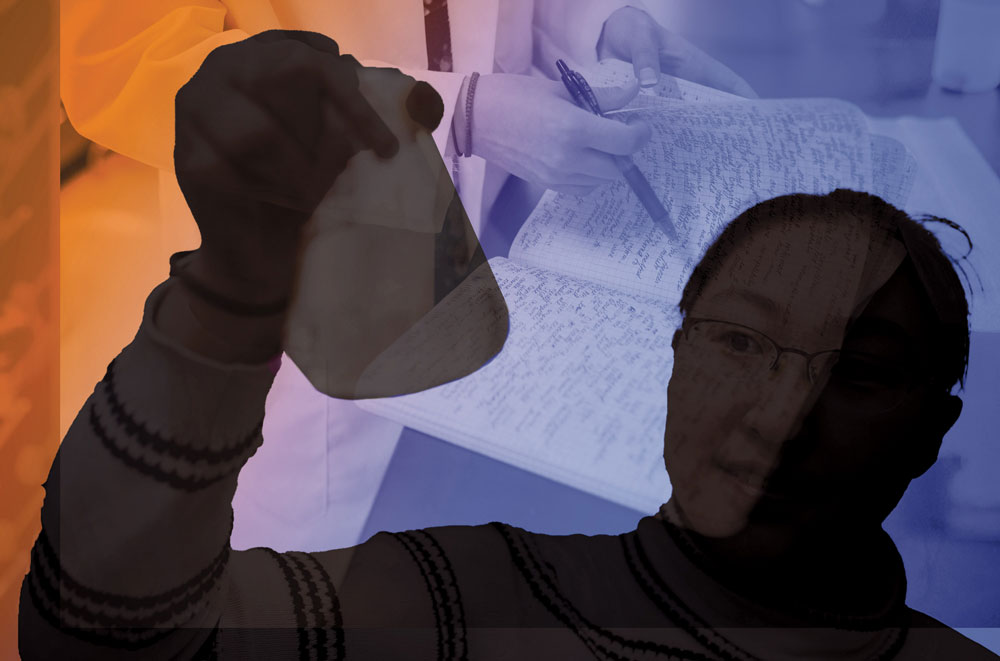
One thing that has remained steadfast in Hoffman’s journey, no matter where life has led her, is her passion for serving others—a passion first sparked as an Admissions tour guide at Gettysburg. Sometimes, it might have been as simple as a soft smile, saying, “Hello,” or listening to a customer who needed someone to confide in. Other times, it was caring for her family or counseling those in need of guidance or direction.
“Being in service to others is part of my fabric. It’s part of my history. It’s part of the tapestry of who I am,” she said. It’s the case for many other Gettysburgians, too.
We see it alive in Nelson, Aghayan, Bright, Eyler, and all Gettysburg graduates who choose to carry their Gettysburg College education with them in their lives to challenge the status quo, ask critical questions, and contribute to change in their unique way. We see it vibrantly across campus in the lives of current students, who through their studies and various co-curricular activities, are finding their purpose—a path forward.
Alexia Ferraro ’24, a first-generation college student double majoring in political science and women, gender, and sexuality studies, aspires to work as a women’s rights attorney, a path inspired by her First-Year Seminar with Prof. Stephanie Sellers: Women’s Health and Sexuality. Daniel Jones ’22 spent the summer and fall semesters studying Arabic globally in Jordan. Leveraging the opportunities he’s seized on campus and internationally, he aims to find a job where he can merge his interests in policy and research, upon his graduation in May. Meem Noshin Nawal Khan ’24, an international student from Bangladesh, is passionate about returning to her home country one day to pursue a career as an environmental chemist—combating two large-scale issues: environmental pollution and climate change.
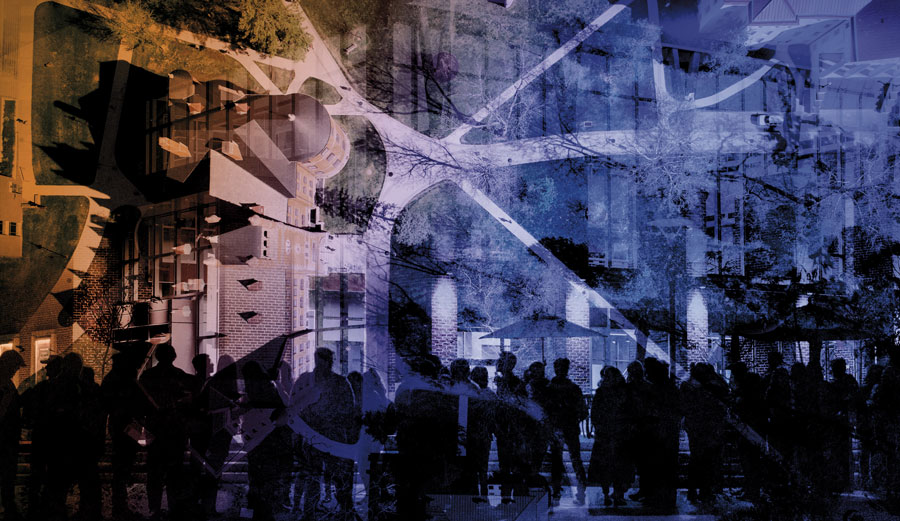
No two Gettysburgians are the same—each unique in their passions, pursuits, and the paths they choose to follow—but at their core, they’re alike in their curiosity-driven desire for more. They enduringly embody the notion that a life of consequence starts here at Gettysburg College—and it doesn’t end here. A Consequential Education propels you toward the future. Its reverberations can be felt in perpetuity throughout the course of your life.
“[The articulation of A Consequential Education] is part of a broader strategy to chart the course of the College in the future. It’s accessing, understanding, and publicly stating the College’s values, which have been long-held, and what we can offer to the next generation of students and alumni, who are looking to be a force for good in the broader society,” said Julius Redd ’07, a member of the College’s President’s Advisory Circle and a principal at Beveridge & Diamond’s Washington, D.C., office, where he represents clients in complex environmental and commercial litigation.
Those who come here, to this College—surrounded by both history and opportunity—further develop their deep-rooted determination and ambition to take up the great and unfinished work of our time. Embracing this work with your whole heart and mind takes a special kind of person, purposefully positioned in this one-of-a-kind place. It requires a truly consequential education—a Gettysburg College education.
“As Gettysburgians, we live and learn in the echo of Lincoln’s words. It is what connects us across the generations and calls us to build a better world,” Gettysburg College President Bob Iuliano said. “Our community believes in this noble charge and commits to it fully. We always have and always will. Perhaps now more than ever, so many throughout this nation and our society are counting on us to live our promise. We will deliver.”
By Molly Foster
Posted: 03/17/22
